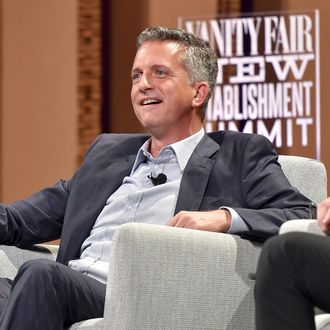
This morning, just in time for its earnings call, Spotify officially announced that it is buying the Ringer, the podcast-heavy digital-media company founded by former ESPN personality Bill Simmons in 2016. Word of such a deal was first reported by The Wall Street Journal in mid-January, which described the talks at the time as “early.” Well, now it’s official: The Sports Guy will be joining Spotify, along with the sizable staff he’s built at the Ringer.
The terms of the deal were not disclosed, but what has been confirmed is a detail that has been the most puzzling: Not only will Spotify absorb the Ringer’s vibrant podcast operation, the Swedish streaming audio platform will also be bringing in the rest of the latter’s digital-media operation, which has aggressively spread itself out across multiple platforms in search of diverse revenue streams. In addition to a thriving audio division, the Ringer has a consumer-facing website (with a fairly large stable of writers and creatives that have unionized), a book-publishing deal, a documentary unit, and an active YouTube operation.
Oh, and that doesn’t include a few podcasts that are exclusive to Luminary, the somewhat troubled paid-podcast platform, which is probably a detail that needs to be sorted out.
Of course, the Ringer isn’t just a sports-media company; it also does a lot of successful work in the pop-culture space (think Binge Mode and The Rewatchables). Furthermore, it’s not just a company built around one person — Simmons — but a staff of over 90 people, many of which are very strong creatives in their own right. There’s some uncertainty in how news of the completed deal will go over with the staff, which is unionized with WGA East; after The Wall Street Journal report came out on the existence of the talks, the Ringer Union issued a statement that the workforce had learned about the deal through press, not through senior management. So far, that situation doesn’t appear to have been remedied.
This acquisition comes in the midst of Spotify’s hard push to become more than a music-streaming platform. Last year, it spent more than $400 million to acquire three podcast companies — Gimlet Media, Parcast, and Anchor — and began expanding its portfolio of exclusive podcast programming and partnerships, including one with the Obamas’ production company, Higher Ground. In November, the company’s CEO Daniel Ek and content chief Dawn Ostroff appeared on the cover of The Hollywood Reporter as part of an ongoing campaign to signal its intent on becoming “the world’s No. 1 audio platform.”
With some caveats, a successful acquisition of the Ringer makes a good deal of sense for Spotify. To begin with, the sports- and pop-culture-heavy website is uniquely strong in audio, with a portfolio of 30-plus podcasts that brings in more than 100 million downloads a month. And unlike some of Spotify’s other podcast acquisitions, there’s no question that the Ringer is able to generate decent revenue for the company. According to another Wall Street Journal article from last January, its audio division exceeded $15 million in ad sales for 2018.
But the addition of the Ringer’s robust audio division would also vastly increase the number of talk-style podcasts in Spotify’s original-programming portfolio, which is currently heavy on the narrative side. This is both a matter of aesthetics and a matter of cost, as talk podcasts are largely considered to be more cost effective than narrative podcasts (not always, but still).
In any case, it should be noted that these talks don’t come out of the blue. The two companies already have an existing working relationship in the form of The Hottest Take, a bite-size daily podcast — which, by the way, we thought was one of the best podcasts from last year.
How Spotify thinks about the Ringer’s audio operations in the context of its larger podcast ambitions will be the thing to watch. A big indicator can be found in this morning’s earnings call, when Ek said of the deal, “What we really did with the Ringer, I think, is we bought the next ESPN.” Which is to say, they’re really thinking about the sports category.
Simmons, of course, has built a substantial career and following through his work in sports media, and the Ringer is, to a large extent, a continued expression of that position. Media about sports is an undeniably lucrative category, fueling valuable businesses across television, talk radio, digital websites, video games, and so on. Podcasting, as well, has its own sports-oriented fortunes, one such example being Barstool Sports, the controversial media company that itself has a strong podcast operation, which recent reports say is being sold off at a valuation of $450 million to Penn National Gaming, a sports-betting company.
But there’s quite a bit of unprecedented potential action to be found in the combination of a sports-media company and a deep-pocketed streaming audio platform with a substantial global reach — something we perhaps haven’t seen in the on-demand audio arena before.


